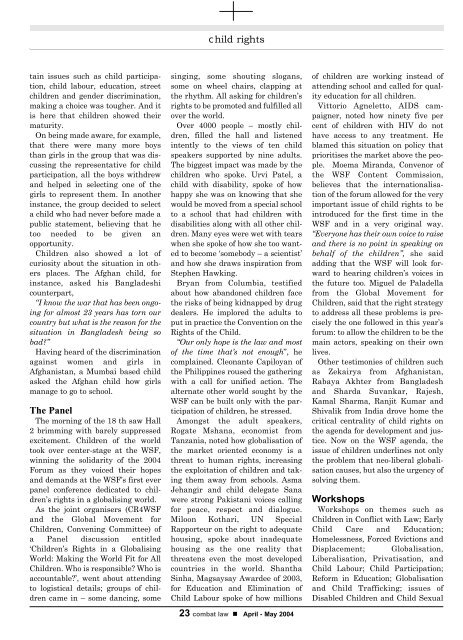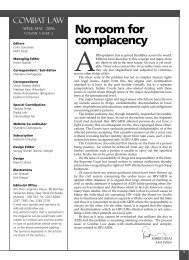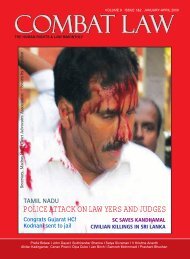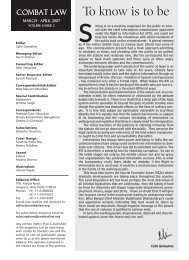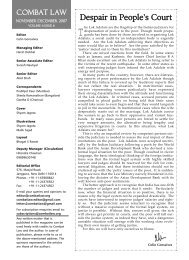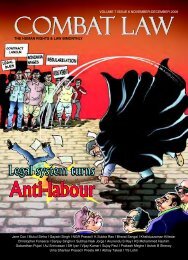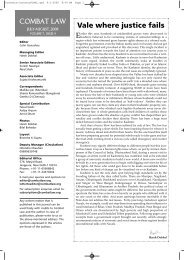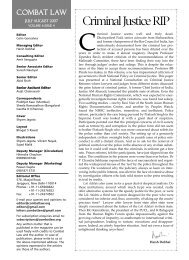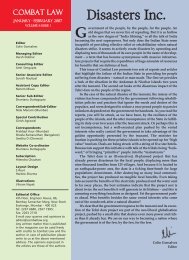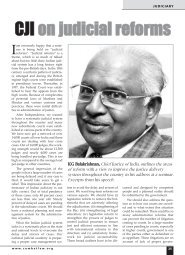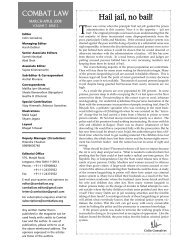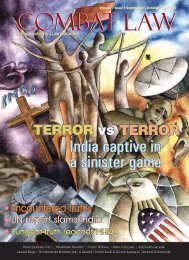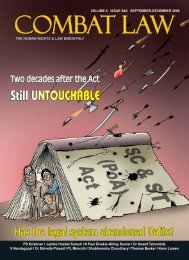PDF, 1.1MB - Combat Law
PDF, 1.1MB - Combat Law
PDF, 1.1MB - Combat Law
You also want an ePaper? Increase the reach of your titles
YUMPU automatically turns print PDFs into web optimized ePapers that Google loves.
child rightstain issues such as child participation,child labour, education, streetchildren and gender discrimination,making a choice was tougher. And itis here that children showed theirmaturity.On being made aware, for example,that there were many more boysthan girls in the group that was discussingthe representative for childparticipation, all the boys withdrewand helped in selecting one of thegirls to represent them. In anotherinstance, the group decided to selecta child who had never before made apublic statement, believing that hetoo needed to be given anopportunity.Children also showed a lot ofcuriosity about the situation in othersplaces. The Afghan child, forinstance, asked his Bangladeshicounterpart,“I know the war that has been ongoingfor almost 23 years has torn ourcountry but what is the reason for thesituation in Bangladesh being sobad?”Having heard of the discriminationagainst women and girls inAfghanistan, a Mumbai based childasked the Afghan child how girlsmanage to go to school.The PanelThe morning of the 18 th saw Hall2 brimming with barely suppressedexcitement. Children of the worldtook over center-stage at the WSF,winning the solidarity of the 2004Forum as they voiced their hopesand demands at the WSF’s first everpanel conference dedicated to children’srights in a globalising world.As the joint organisers (CR4WSFand the Global Movement forChildren, Convening Committee) ofa Panel discussion entitled‘Children’s Rights in a GlobalisingWorld: Making the World Fit for AllChildren. Who is responsible? Who isaccountable?’, went about attendingto logistical details; groups of childrencame in – some dancing, somesinging, some shouting slogans,some on wheel chairs, clapping atthe rhythm. All asking for children’srights to be promoted and fulfilled allover the world.Over 4000 people – mostly children,filled the hall and listenedintently to the views of ten childspeakers supported by nine adults.The biggest impact was made by thechildren who spoke. Urvi Patel, achild with disability, spoke of howhappy she was on knowing that shewould be moved from a special schoolto a school that had children withdisabilities along with all other children.Many eyes were wet with tearswhen she spoke of how she too wantedto become ‘somebody – a scientist’and how she draws inspiration fromStephen Hawking.Bryan from Columbia, testifiedabout how abandoned children facethe risks of being kidnapped by drugdealers. He implored the adults toput in practice the Convention on theRights of the Child.“Our only hope is the law and mostof the time that’s not enough”, hecomplained. Cleonante Capiloyan ofthe Philippines roused the gatheringwith a call for unified action. Thealternate other world sought by theWSF can be built only with the participationof children, he stressed.Amongst the adult speakers,Rogate Mshana, economist fromTanzania, noted how globalisation ofthe market oriented economy is athreat to human rights, increasingthe exploitation of children and takingthem away from schools. AsmaJehangir and child delegate Sanawere strong Pakistani voices callingfor peace, respect and dialogue.Miloon Kothari, UN SpecialRapporteur on the right to adequatehousing, spoke about inadequatehousing as the one reality thatthreatens even the most developedcountries in the world. ShanthaSinha, Magsaysay Awardee of 2003,for Education and Elimination ofChild Labour spoke of how millions23 combat law • April - May 2004of children are working instead ofattending school and called for qualityeducation for all children.Vittorio Agneletto, AIDS campaigner,noted how ninety five percent of children with HIV do nothave access to any treatment. Heblamed this situation on policy thatprioritises the market above the people.Moema Miranda, Convenor ofthe WSF Content Commission,believes that the internationalisationof the forum allowed for the veryimportant issue of child rights to beintroduced for the first time in theWSF and in a very original way.“Everyone has their own voice to raiseand there is no point in speaking onbehalf of the children”, she saidadding that the WSF will look forwardto hearing children’s voices inthe future too. Miguel de Paladellafrom the Global Movement forChildren, said that the right strategyto address all these problems is preciselythe one followed in this year’sforum: to allow the children to be themain actors, speaking on their ownlives.Other testimonies of children suchas Zekairya from Afghanistan,Rabaya Akhter from Bangladeshand Sharda Suvankar, Rajesh,Kamal Sharma, Ranjit Kumar andShivalik from India drove home thecritical centrality of child rights onthe agenda for development and justice.Now on the WSF agenda, theissue of children underlines not onlythe problem that neo-liberal globalisationcauses, but also the urgency ofsolving them.WorkshopsWorkshops on themes such asChildren in Conflict with <strong>Law</strong>; EarlyChild Care and Education;Homelessness, Forced Evictions andDisplacement; Globalisation,Liberalisation, Privatisation, andChild Labour; Child Participation;Reform in Education; Globalisationand Child Trafficking; issues ofDisabled Children and Child Sexual


